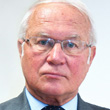news
Prof. Vilius Jonas Grabauskas
President, Health Forum; Chancellor,
Medical Academy,
Lithuanian University
of Health Sciences (LUHS).
October 2013
Look beyond healthcare to build sustainable healthcare systems
There are many influences beyond the orbit of health systems that contribute to health status. Factoring these economic and social determinants into policy promises both to improve health and make healthcare systems more sustainable. In putting the spotlight on best practice from around Europe, the Lithuanian Presidency conference aims to help release this great untapped potential to improve health, says Professor Vilius Grabauskas
The Lithuanian Health Forum was established in 2011 to put a focus on the many influences beyond the reach of the health system that contribute to health status, and it is in his capacity as President of the Forum that Professor Vilius Grabauskas is looking forward to welcoming delegates to the conference ‘Sustainable Health Systems for Inclusive Growth’ in Vilnius on November 19 – 20.
The Lithuanian Health Forum looks to a much broader context and set of criteria for health than the traditional view of it being about the interaction between a doctor and a patient. “The Forum views health as a multi-faceted, multi-policy responsibility,” Grabauskas says.
However, the concept that cross-sector cooperation is central to health is not always understood. The fact that this approach underpins both World Health Organisation (WHO) thinking and the European Union’s Health 2020 policy, means the conference will be an important opportunity to discuss these ideas and showcase international best practice in applying them.
“It’s important that high-level speakers from all over Europe are coming to Vilnius; and it’s by happy coincidence that our annual Health Forum Conference coincides with this event in the Lithuanian Presidency,” Grabauskas said.
The thinking of the Lithuanian Health Forum is very much in parallel with the EU’s Health 2020 policy. Given this, “It’s extremely important for all of us in the entire European region to come together and see what needs to be done in practical terms,” said Grabauskas. “Lithuania as a country is very interested to learn more from the experiences of other countries, and of how a multi-sector approach can work in practice.”
For Grabauskas, one of the most compelling examples is the way in which Finland reshaped its healthcare system, moving from one centred on medical professionals in hospitals, to a more community-based structure.
It’s extremely valuable to learn how wide-scale changes such as this are implemented, Grabauskas believes. “First there must be political will. Then it would be helpful to understand how to mobilise other sectors beyond the confines of the health system,” he said.
The starting point is in building awareness that good health depends on far more than the patient/doctor relationship, as evidenced by the way in which social inequality feeds into health inequality. The issue of health inequality is central to health policy formulation in Lithuania, Grabauskas says, noting that Lithuania was a pioneer in publishing data on inequality through the WHO.
“This is an example of things that have been done to improve healthcare based on international standards and concepts,” Grabauskas says.
Building a virtuous circle from prevention to sustainability
The rising incidence of non-communicable diseases is often cited as one of the biggest threats to the sustainability of healthcare systems. The links between diet and the risk of developing a non-communicable disease provide a potent example of the need for a multi-factorial approach that links social actions to health. “The social environment is very important: how can the unemployed afford a healthy diet?” Grabauskas asks.
Grabauskas was involved in the design of the WHO’s strategy for the prevention of what are often termed lifestyle diseases, and as a medical doctor and cardiac specialist, he is pleased to see the positive impact.
“I am a believer in prevention: I am happy that today’s generation of medical doctors in cardiology have taken on board the significance of risk factors. This shows the potential of prevention, even in the context of clinical practice.”
There is a similar picture with ageing, which again is portrayed as poised to undermine the sustainability of health systems. “Yes the population is ageing. But there is evidence to show that people aged 70-plus are much healthier than a generation ago,” Grabauskas said.
An international perspective
The whole-of-government approach to healthcare is being taken seriously by the Lithuanian Government, as evidenced by the number of ministries that will be represented at the conference.
Similarly, the range of speakers and delegates underlines how many different sectors and disciplines are becoming involved and the importance that is attached to sharing experience from different countries. “It’s not just a national discussion; it will embrace the European Union perspective, the non-governmental organisation perspective, the views of people with many different roles,” Grabauskas said.
Building on previous healthcare-related events of the Lithuanian Presidency, the conclusions from the Vilnius conference will be summarised by Grabauskas in the concluding session and presented to the EU Ministerial Council meeting in December.

